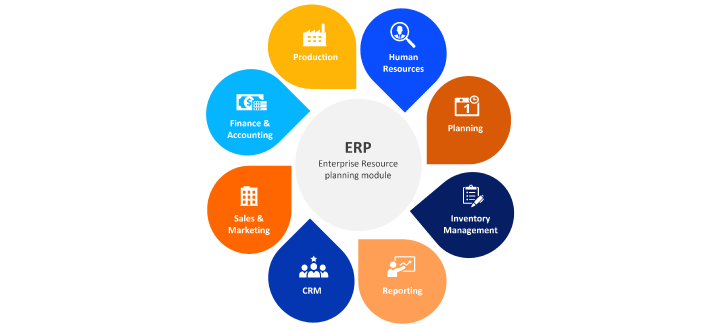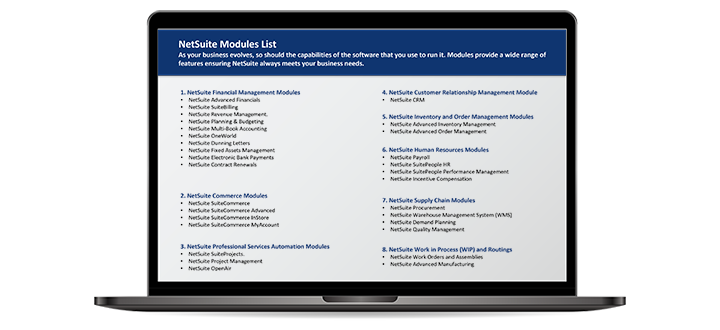

Varun S
NetSuite: The Modern Cloud ERP for Growing Enterprises
Understanding Cloud ERP
In cloud ERP, users can access critical financial and operational information over the internet as well as automate business processes. In an integrated ERP system, inventory and order management, human resources, and customer relationship management are all managed together. Cloud ERP technology uses shared databases to provide access to the same data across different groups within an organization. This enables the organization to manage business processes and information more effectively, as well as improve collaboration across departments. A cloud ERP solution can reduce upfront costs for all computing infrastructure and software licenses, minimize maintenance and support costs, enable deployment faster, and allow access to business data from anywhere with an Internet connection.
An Enterprise Resource Planning (ERP) system can be used in many ways in an organization, from accounting to procurement, project management, risk management, compliance, and supply chain management.
NetSuite ERP?
The NetSuite cloud-based enterprise application suite offers a wide range of enterprise applications. There are more than 26,000 fast-growing companies around the world using NetSuite.
The NetSuite ERP cloud-based solution is a comprehensive ERP system designed for high-growth, mid-sized and large businesses. It provides CRM systems for sales, service and marketing automation, human resources (HR) systems for personnel records, performance analytics and payroll, and professional services automation (PSA) for planning and tracking projects, omnichannel commerce to handles online and in-store sales. Oracle NetSuite ERP provides key performance indicators (KPIs) and reports for the entire organization gives leaders a real-time, 360° view of the business.

What makes NetSuite ERP so special?
Here are a few reasons to choose Oracle NetSuite
- An integrated business views
- Integrated Business Intelligence (BI)
- Fully cloud-based
- ERP Built-in flexibility and simplicity
An integrated business view
NetSuite is a comprehensive business management platform that enables companies to run their entire operations on one platform. It combines finance, supply chain, manufacturing, HR, and e-commerce under one system with a single database, so employees don’t need to use separate software packages to monitor different aspects of their businesses.
Integrated Business Intelligence (BI)
A single source of knowledge is maintained by all NetSuite applications, which feed information into and draw information from the central database. This unified architecture facilitates faster time-to-productivity by eliminating the need for third-party integrations that may not be reliable or cannot support real-time updates. The common user interface is also shared across all modules, reducing training time. It also includes multi-step processes such as order-to-cash, procure-to-pay, and others that can be initiated from one application without having to re-enter or export data.
Fully cloud-based ERP
NetSuite was built and born in the cloud. Most “cloud” ERP systems are actually hosted or hybrid clouds – essentially on-premises applications retrofitted for access over the Internet. In addition, these systems suffer from many of the same issues as traditional systems, including version lock-in, a long upgrade time, and scalability issues.
Built-in flexibility and simplicity
NetSuite has an impressive set of features, making it ideal for use in a variety of industries. Whether you’re a multinational with many subsidiaries or a startup building your first product, the platform can be tailored to fit your processes and corporate structure.

NetSuite Modules:

An evaluation of NetSuite versus standard ERP solutions:
We can compare NetSuite’s capabilities against the market average when we know whether or not the company supports the eight primary modules and 3,539 features.
In the Financials module, NetSuite covers 89% of the functionality, which is impressive.
Oracle NetSuite covers 81% of Human Resources functions, giving it an edge over other ERP vendors, who support an average of 70% of characteristics.NetSuite has a 94% coverage rate in Manufacturing Management, based on Oracle’s data. Other ERP packages in the market average 82% coverage, meaning Oracle NetSuite software has an observable edge here.
In addition to its 91% inventory management coverage, NetSuite is slightly ahead of its competitors, who average 86%.
It covers an impressive 98% of Quality Management attributes in comparison with rival ERP software packages, which cover an average of 82% of these characteristics.
The Oracle NetSuite software supports 89% of Product Technology characteristics, which is considerably more than the average competitor (66%), so it enjoys a considerable advantage over the competition in terms of
- Financials
- Human Resources
- Manufacturing Management
- Inventory Management
- Purchasing Management
- Quality Management
- Sales Management
- Product Technology
Conclusion
The NetSuite platform gives customers the flexibility to expand the system’s capabilities and make it unique to their business needs. This gives customers the confidence to meet the business challenges of today and tomorrow without the fear of version lockdown. When the platform is upgraded, all customizations are carried over.
Related Insights




Top 5 Hard Truths About Your Governance Strategy

ETL Simplified: Storing and Transforming Data Fully Inside Databricks

